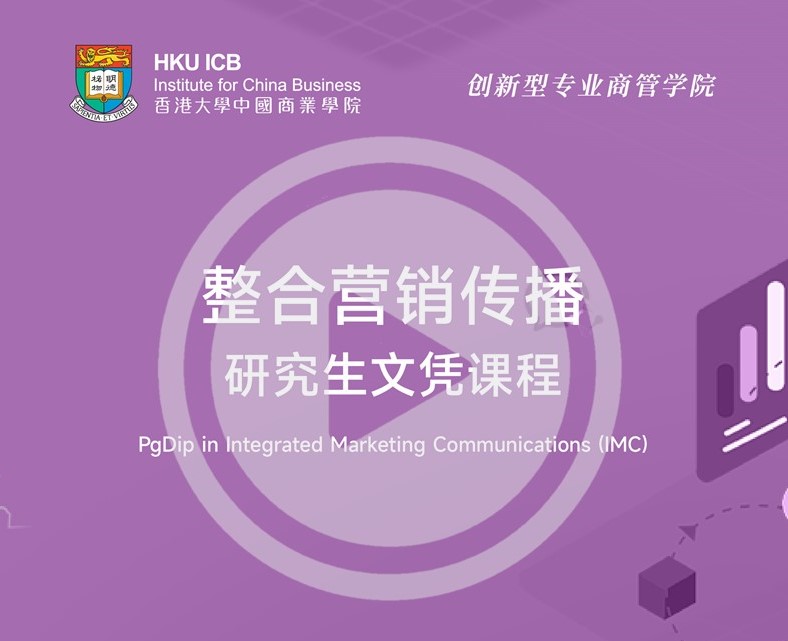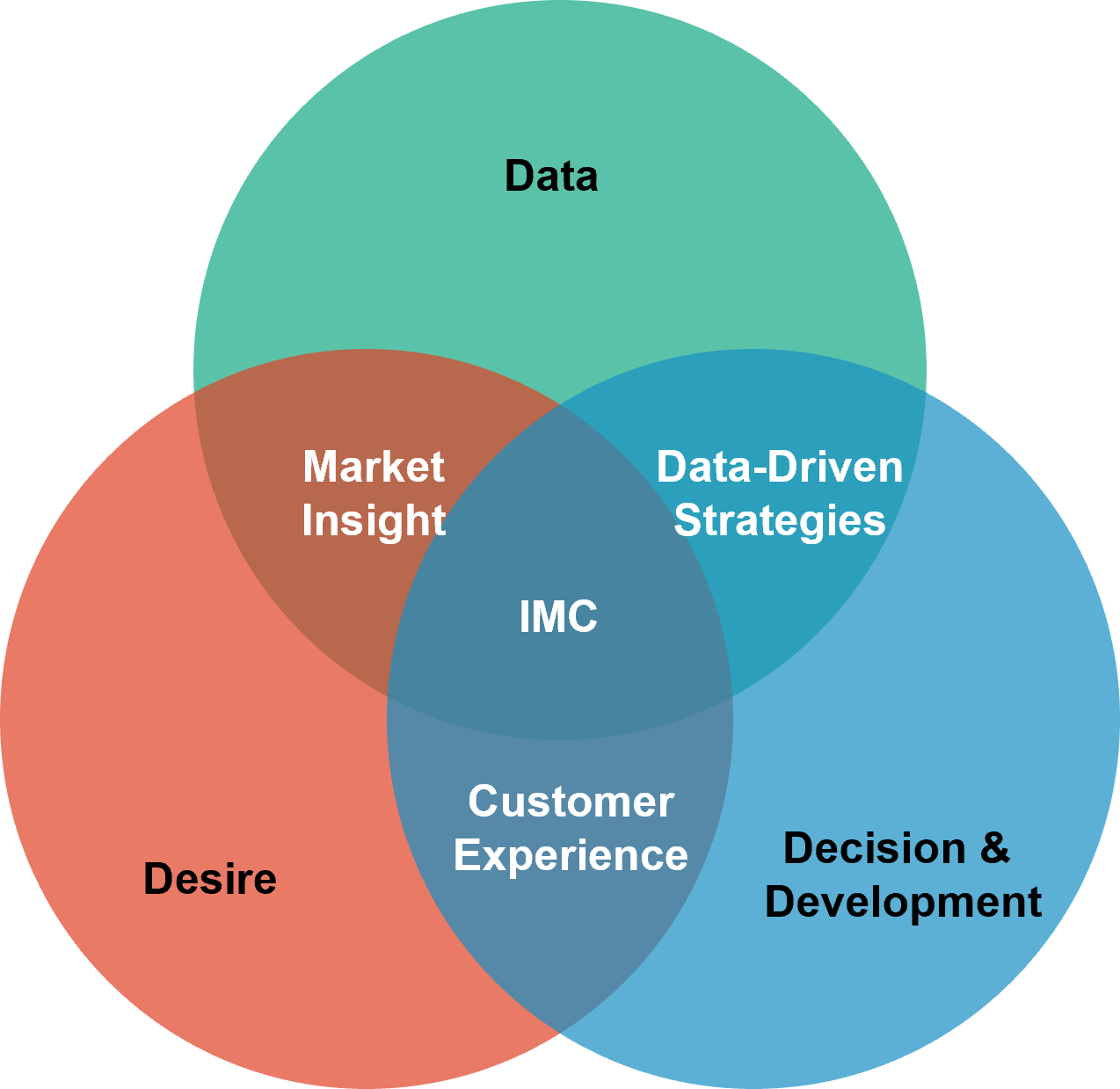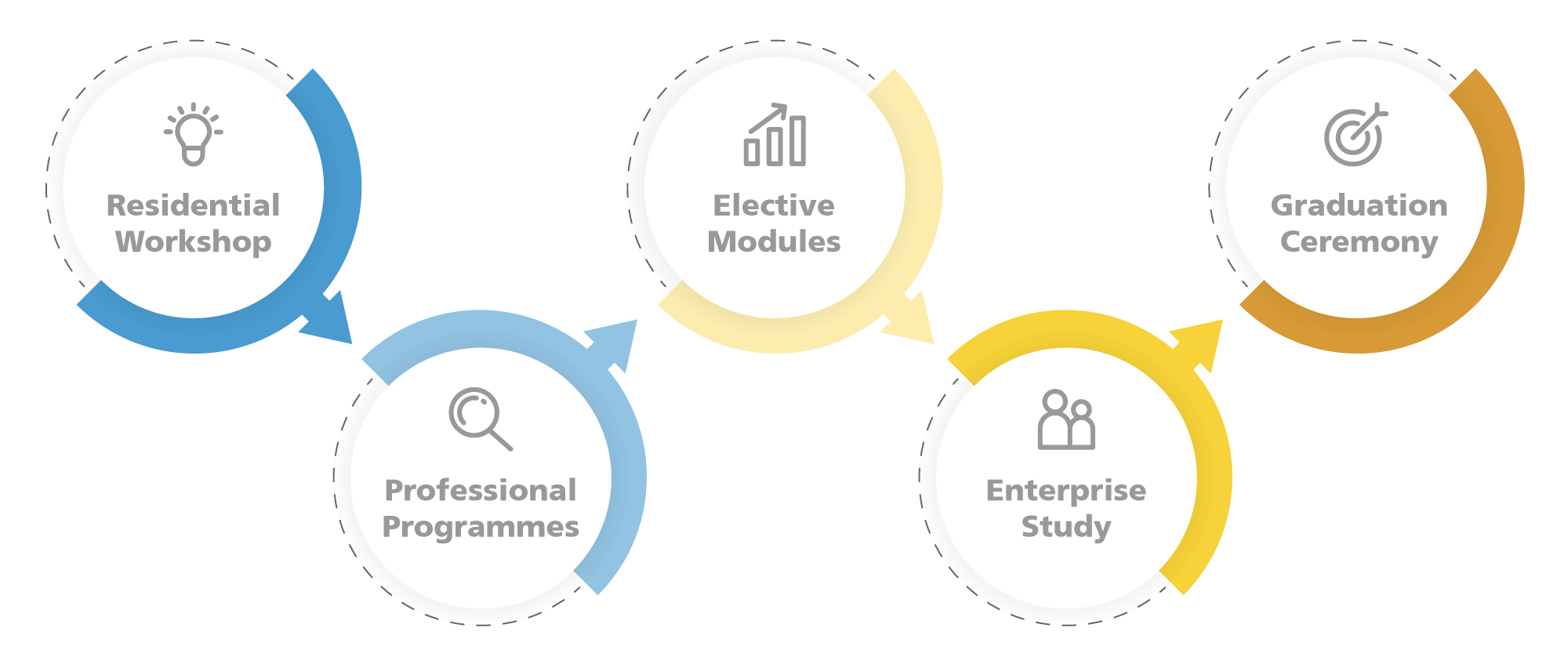Insightful, Precision and Innovative Marketing

Master the Essence of Marketing to Win in an Ever-Changing Market
The essence of marketing lies in demand. Without demand, there would be no marketing. However, marketing plans without market insights are prevailing, as if they are aimless, let alone the integration of branding and conversion. In the dual transformation of digital intelligence and consumer empowerment, businesses must not only precisely reach their target audiences but also capture human needs amid the flood of data, uphold brand missions amid technological disruptions, and build sustainable competitiveness in a dynamic, globalized market.
Bona fide marketing is about brands creating and delivering immersive experiences that are more memorable than competitors’, providing added value throughout the entire consumer journey, driving win-win transactions, and achieving sustainable business growth.
Integrated Marketing Communications (IMC), centered on consumer insights and data-driven strategies, consolidates omnichannel resources. It efficiently acquires customers in incremental markets through viral growth, enhances user value in existing markets via refined operations, and systematically ensures that target audiences understand the brand’s value propositions during their consumer experiences, succeeding in a highly competitive market.
IMC is committed to nurturing next-generation marketing leaders who can harness data intelligence, understand human nature, and lead long-term value creation. These leaders will leverage cross-border innovation and technological empowerment to navigate an ever-changing market.
Programme Highlights
Comprehensive Coverage of Cutting-Edge Trends: Deep integration of AI, digital intelligence marketing, and metaverse technologies to seize future opportunities.
Dual Focus on Data and Humanity: Seamlessly combine consumer psychology with AI-driven decision-making for data-smart strategies and human-centric insights.
Practical, Action-Oriented Learning: Solve real-world challenges through live business cases, simulations, and cross-platform content campaigns.
Sustainability at the Core: Systematically embed corporate resilience and ESG strategies into IMC practices to amplify long-term brand value.
Key Advantages
20 Years of IMC Excellence: A flagship program from HKU School of Professional and Continuing Education (HKU SPACE), continuously evolved to stay ahead of industry shifts.
Exclusive "4D Marketing Framework": Integrate Data, Desire, Decision, and Development into a cohesive strategy for modern marketing mastery.

Help participants master the essential skills for the next five years, becoming indispensable marketing leaders in the face of AI disruption, technological iteration, and ESG transformation.
Course Benefits
A Systematic Methodology: From insights to execution, mastering core competencies in IMC throughout the entire chain.
A Complete Set of Practical Cutting-edge tools: AI content generation, zero-party data collection, ESG evaluation models, etc., ready for immediate use.
National Alumni Network: Join a community of over 6,000 elite alumni, gaining access to cross-disciplinary collaboration resources.
Practical Knowledge: Diverse and in-depth business cases to gain insights into real corporate challenges.
Programme Content
- Inauguration Ceremony-cum-Residential Workshop
- Integrated Marketing and New Media Communication
- Consumer Psychology
- Consumer insights and Data Analytics
- Brand IP and Narrative Marketing
- Experience Design and Needs Management
- AI and Marketing Decision Making
- Marketing Strategies in the Digital Age
- Social Marketing and Brand Communication
- Public Relations Strategies and Crisis Management
- ESG Strategies and Sustainable Marketing
- Final Project
Teaching Members’ Qualifications
In addition to the senior faculty members from the HKU Institute for China Business, this programme also recruits experienced executives from 4A advertising agencies, international PR agencies, international market research companies, online marketing companies in Asia Pacific and Mainland China, such as Ogilvy, Dentsu, GroupM, JWT, ACNielsen, etc., as well as senior marketing communications management in multinational companies such as Pfizer, Montblanc, Volkswagen Group, Time Warner Group, FOX Networks Group, Oracle Group and others. All the faculty members have extensive experience in marketing and communications management in Mainland China, Hong Kong, Taiwan and overseas organisations, and are able to provide students with comprehensive professional training and practical guidance.

方世伟先生
Mr Shih-wei Fang
Adjunct Professor; 25 HOURS* Partner and Chief Strategy Officer (CSO); Former CEO of PONY Greater China; Former Vice President and Chief Marketing Officer (CMO) of Li Ning Group

汪志谦先生
Mr Vincent Wang
Adjunct Associate Professor; Founder and Principal Consultant of Verite Consulting International Limited

谭北平先生
Mr Beiping Tan
Adjunct Associate Professor, VP of Mininglamp Group, Dean of Miaozhen Marketing Science Academy

吕建中博士
Dr Jianzhong Lu
Adjunct Associate Professor, currently Board Member of Global Reporting Initiative GRI and Deputy Director General of China CSR Think Tank, PhD of Ecommerce (Royal Melbourne Institute of Technology)

李国威先生
Mr Geoff Li
Adjunct Associate Professor; Founder of VisionWe Management Consulting; Director of China International Public Relations Association; Former Director of Communications at General Electric (GE) Greater China

钮则勋教授
Prof Tse-hsun Niu
Adjunct Professor; Commentator on Cross-Strait Relations; Senior Consultant of Public Relations and Consulting Firm

曹成博士
Dr Rodney Cao
Adjunct Associate Professor; Founder of BrandVista

董浩宇博士
Dr Charley Dong
Part-time Lecturer; O2 Tech. Business Partner

施涵博士
Dr Han Shi
Adjunct Associate Professor; Chief Scientist of the National Green Development Alliance for Economic and Technological Development Zones under the Ministry of Commerce of China; ADB Industrial Green Growth Consultant

张天博士
Dr Sky Zhang
Part-time Lecturer; X-Sigma Operating Partner、PhD(Engineering)and Master’s Degree in Computer Science

刘展术先生
Mr Francis Liu
Adjunct Associate Professor; Former Executive Vice President of Jaguar Land Rover (China)

袁启亮先生
Mr Ray Yuen
客座讲师﹑美国时代华纳集团及福克斯传媒集团(中国)前高管﹑全思社首席团队分析师及首席学习官﹑国际教练联盟(ICF)全球认证企业教练

吴公鼎先生
Mr Kung-Ting Wu
Part-time Lecturer; Managing Partner of ELA Bridge Associates; MBA in Wharton School, University of Pennsylvania

宗瑞兴先生
Mr Richard Zong
Part-time Lecturer; Director of Ipsos Digital Insight Research Institute

陈传洽先生
Mr Calvin Chan
Part-time Lecturer; CEO of VIOOH China; The Trade Desk’s first General Manager for China

胡超先生
Mr Joe Hu
Part-time Lecturer; Former Brand Leader of Goodyear Tire; Master of Management from the London School of Economics, UK; Master of Marketing from Birmingham University, UK

陆頲博士
Dr Tim Lu
Part-time Lecturer; Digital Marketing Director of SAIC Motor; Former Big Data & CRM Senior Manager of SAIC GM

张君毅先生
Mr Junyi Zhang
Part-time Lecturer; Partner at Oliver Wyman; Former Founding and Managing partner for NIO Capital

郭小言女士
Ms Georgia Guo
Part-time Lecturer; Former McDonald’s China Head of Innovation; Former IDEO China Marketing Director

杨仕名先生
Mr Kevin Yeung
Part-time Lecturer; Former Associate Director

马珮玉女士
Ms Claudia Ma
Part-time Lecturer; Ex-VP, Head of Consulting Service, OgilvyOne Worldwide, China; Chief of Digital Experience Officer, Cothinker Marketing Consulting Ltd.

吴文芳先生
Mr Willde Ng
Well-known Advertiser; Advertising Director; Creative Strategist; Writer

李刚健博士
Dr Jarrow Li
Part-time Lecturer; Co-founder of Shanghai Yuhan Information Technology Company; former Brand Commerce Chief Consultant at Dentsu Aegis China

夷定先生
Mr Eding Yi
Part-time Lecturer; Scholar in Aviation Law and Public Policy; Expert in Aviation Management, Entrepreneurship, and Innovation
Programme Features
Agile Consumer Insights
The global economy has evolved from the physical economy of the 18th century (1.0) to the emotional economy of the 21st century (3.0), experiencing iterations of three major economic systems. This evolution aligns with the development trend of marketing from 1.0 to 5.0.
In the era of emotional economy, consumers increasingly value soft skills such as empathy, interpersonal relationships, experiences, and emotional value. Brands need to gain a deep understanding of consumers' minds and decision-making processes through sharp consumer insights to uncover the essence behind marketing phenomena.
Data-driven Insights: Precisely capture consumer needs and behavioral patterns through zero-party data, first-party data, and AI analytics tools.
Humanized Understanding: Combine consumer psychology and neuroscience to decode consumers' decision-making process.
Formation of Emotional Loop: Consumer emphasis on emotional value drives brands to enhance emotional service levels, fostering brand preference and loyalty.
Related Modules:
- “Integrated Marketing and New Media Communication”: Mastering knowledge and methods for integrating brand communication in new media.
- "Consumer Psychology": Learn about consumer behavior and decision-making psychology.
"Consumer insights and Data Analytics": Master data-driven insight tools and methods.
"Experience Design and Demand Management": Design consumer-centered experience journeys.
Precise Market Positioning
The impact of technology on the economy and marketing is revolutionary. From VR, AR, and blockchain before the pandemic, to the rise of the metaverse during the pandemic, and the recent outbreak of generative AI (such as DeepSeek, Kimi, Gemini), brands must understand the principles and applications of these disruptive technologies under the trend of Industry 4.0 and combine them with classic marketing theories (such as 4Ps) to achieve "the integration of principles and techniques."
AI Empowerment of 4Ps:
Product (or Service): Achieve batch personalization through AI, provide precise recommendations based on consumer historical data, and enhance customer satisfaction and loyalty.
Price: Utilize AI combined with macro and micro data to dynamically adjust pricing strategies and increase profitability.
Place: Integrate online and offline channels to create a seamless personalized consumer experience.
Promotion: Generate cross-media content through AI, achieve precise delivery, and evaluate effectiveness.
Humanized Technological Applications: In the context of the emotional economy and Marketing 5.0, when brands use technology to empower marketing, they must focus on humanization to take a leading position in the minds of target customers.
Related Modules:
"Marketing Strategies in the Digital Age": Master the application of digital and intelligent technologies in marketing.
"AI and Marketing Decision Making": Leverage AI to optimize marketing strategies.
"Brand IP and Narrative Marketing”: Developing Strategies for Brand IP and Narrative Marketing to Enhance Customer Loyalty strategies.
Unique Marketing Communication Strategy
Population structure is the third key factor influencing IMC. Global aging populations, negative population growth in mainland China, and the rise of the Alpha generation bring new challenges and opportunities for brands.
Social Marketing and Brand Communication: Build deep connections between brands and consumers through community operations and user-generated content (UGC).
ESG Strategies and Sustainable Marketing: Develop ESG marketing strategies to enhance corporate resilience and drive sustainable marketing for brands.
Effective Public Relations and Crisis Management: Develop crisis plans in advance during brand communication and maintain brand reputation through efficient public relations management.
Related Modules:
"Social Marketing and Brand Communication": Master community operations and user interaction strategies.
"ESG Strategies and Sustainable Marketing": Learn how to enhance brand long-term value through sustainable development strategies.
"Public Relations Strategies and Crisis Management": Enhance brand resilience and respond to complex communication environments.
Learning Journey

Learn More》 Elective Modules Enterprise Study
Target Learners
Business Leaders: Develop data-driven integrated marketing strategies to enhance brand long-term value.
Marketing Professionals: Master AI tools, consumer insights, and omni-channel communication skills.
Entrepreneurs: Build a differentiated brand from 0 to 1 and mitigate market risks.
Professionals transitioning into marketing: Gain digital tools and sustainability strategies to unlock new career paths.
Students’ Profiles
Past students of this programme came from major companies including: Baidu, Sina, Netease, Tencent, Microsoft, Intel, IBM, Samsung, HP, Canon, Mitsubishi (China), Mercedes-Benz, BMW, GUCCI, Nike, Adidas, IKEA, Carrefour, Unilever, Coca-Cola, Pepsi (China), Bayer, Novartis, Abbott, China Merchants Bank, HSBC, Standard Chartered Bank, Schneider Electric, ThyssenKrupp, FedEx, Lane Crawford, Amway, Shanghai Jahwa, Kraft, McDonald's, KFC, Lee Kum Kee, JDB Group, China Telecom, China Mobile, CCTV, Phoenix TV, Hunan TV, Jiangsu TV, HKSTV, Ogilvy Advertising, Dentsu Advertising, Leo Burnett, JWT, Hill & Knowlton, Ruder Finn, BlueFocus, Shun Ya International, Consulate General of the United Kingdom, etc.
Graduation Certificate
Upon completion of the "Residential Workshop", 10 compulsory modules and the "Integrated Marketing Communications Final Project", and after passing the evaluation, students will be awarded the "Postgraduate Diploma in Integrated Marketing Communications" by the University of Hong Kong at the postgraduate level.
Fees and Charges
| Application fee: | 500 RMB |
| Tuition fee: | 118,000 HKD |
| Meals and travel expenses: | Students are responsible for their own accommodation and transportation during the programme. If the Inauguration Ceremony-cum-Workshop is held offline, accommodation during the period will be arranged by the Institute and the costs will be covered accordingly. |
Programme Enquiries
| Selena Shu - (010) 6596 9113 |
| Sharon Wang - (021) 6841 1262 |
| Alice Zhou - (0755) 2360 1593 |
| Catherine Fan - (020) 2206 0511 |
| May Zhang - (028) 8445 4626 |




.png)